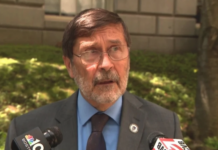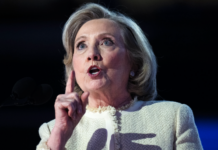Could Letitia James’ crusade against Donald Trump come crashing down? It’s looking more likely after the latest round of skepticism from the New York state appellate court. For two years, New York’s attorney general has been pursuing Trump in a civil lawsuit accusing him of fraudulently inflating his wealth. And while Trump fought hard before and during the trial to get the court to step in, the appellate judges now seem more inclined to question the case—especially the jaw-dropping $450 million judgment.
Trump had to post a massive bond just to force the judgment into review, but now that the appellate court is finally taking a closer look, things are starting to tilt in his favor. During a hearing in Manhattan, a five-judge panel expressed deep skepticism about both the validity of the case and the enormous judgment handed down by Judge Arthur Engoron. Even the New York Times, not exactly known for giving Trump a break, reported that the judges were far from convinced by James’ arguments.
One of the more telling moments came when Justice Peter Moulton, who seemed the most supportive of James’ position, marveled at the sheer size of the award. He questioned how James’ office could justify such a massive penalty in a case where—get this—there were no actual losses or victims. As Moulton put it, “where parties left these transactions happy about how things went down,” what’s the rationale for this level of punishment?
And Moulton wasn’t alone. Justice Friedman, who was the most skeptical, cut right to the heart of the matter, asking whether there’s any precedent for suing “to upset a private business transaction that was between equally sophisticated partners.” Trump’s business dealings with Deutsche Bank were well-documented. Deutsche Bank didn’t just work with Trump—they knew exactly what they were getting into. They conducted their own property valuations, got repaid in full, and even testified that they would gladly do business with Trump again. It’s pretty hard to argue that the bank was defrauded when they seem eager for round two.
That’s not all. Presiding Justice Dianne T. Renwick chimed in with another piercing question, asking, “And little to no impact on the public marketplace?” Again, if no one lost money and no consumers were harmed, who exactly is the victim here? The AG’s team tried to argue that a previous case involving Lehman Brothers provided the legal basis for pursuing Trump. But Justice Friedman wasn’t buying it. He pointed out that the Lehman Brothers case involved unsophisticated consumers—average folks who got fleeced—not a global investment bank like Deutsche Bank, which knew precisely what it was doing.
Friedman summed it up perfectly: “That hardly seems that it justifies bringing an action to protect Deutsche Bank against President Trump. You’ve got two really sophisticated parties in which no one lost any money.”
And that’s where the absurdity of this case becomes clear. This isn’t about protecting the little guy or making things right for a victim of fraud. It’s about political theater. Two of the judges even voiced concerns about what “guardrails” exist to stop an AG from weaponizing her office against political opponents or disfavored businesses. Sound familiar? It’s the same concern many Trump supporters have voiced since day one—that James has been waging a politically motivated war against Trump.
Even New York’s Governor Kathy Hochul got caught in the crosshairs during the trial when she assured investors that Donald Trump was a “special case,” as if to say that all bets are off when it comes to him. That’s a message that should make anyone—regardless of their political leanings—raise an eyebrow.
The judges didn’t use the word “lawfare,” but it’s clear that a couple of them are starting to see this for what it is: a politically charged case with an inflated judgment that doesn’t seem to have much grounding in reality. We’ll see what the court decides soon, but after Thursday’s hearing, Trump’s team has every reason to feel confident. James’ attempt to bankrupt her political bête noire could be on very shaky ground.







